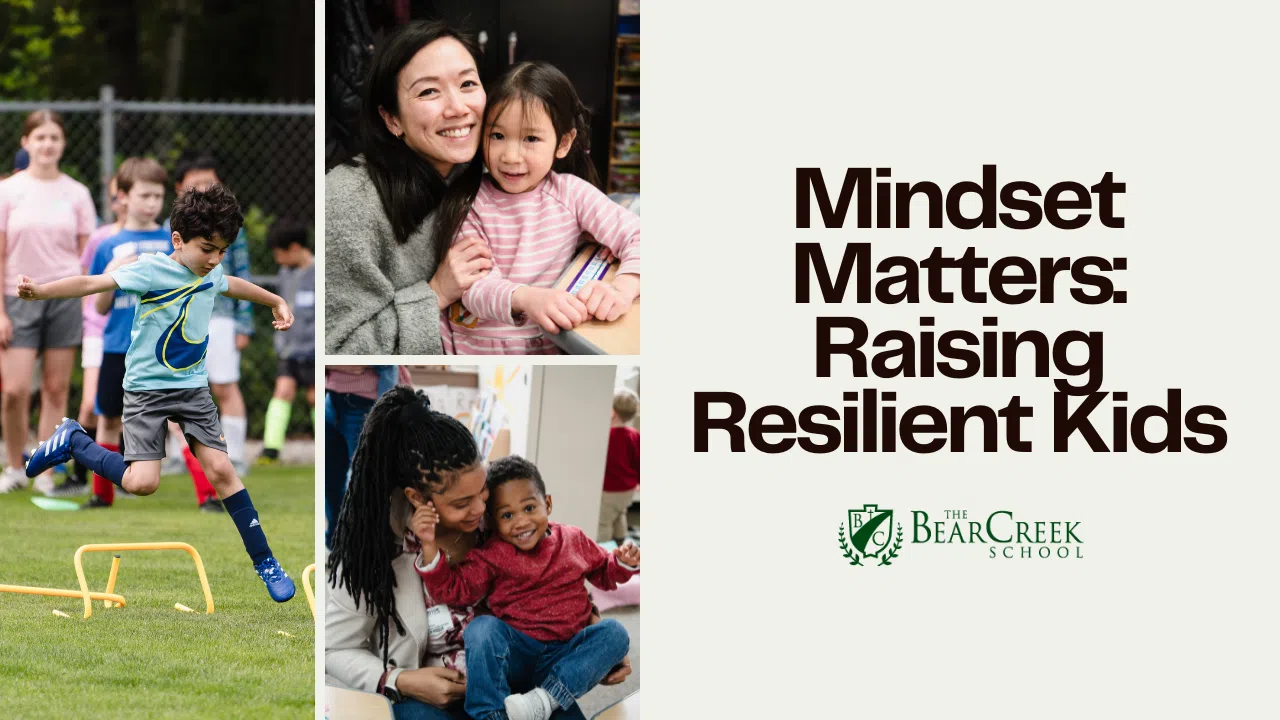Parenting is a journey of equipping our children with the tools they need to thrive. One of the most powerful tools we can give them is their mindset—the lens through which they view the world. Just as our own mindset shapes how we navigate life’s challenges, we must teach our children to develop a mindset grounded in God’s grace—one that fosters resilience, gratitude, and generosity.
At the heart of this mindset is a strong, secure relationship with us as parents and ultimately, with God. Let’s explore how we can guide our children to develop a mindset for success, rooted in faith.
Growth Mindset: The Power of “Yet”
Philippians 4:13 reminds us, “I can do all things through Christ who strengthens me.” A growth mindset is built on the belief that abilities develop through effort and perseverance. Instead of saying, “I can’t do this,” we want our children to say, “I can’t do this—yet.”
A child with a growth mindset is able to:
- Face challenges with confidence rather than fear of failure
- Develop perseverance by learning that setbacks are opportunities for growth
- Stay motivated to work hard, knowing that success is built through effort
How to Foster a Growth Mindset
- Build Stamina. Encourage your child to take on small challenges that require focus and effort. Whether it’s reading a book or practicing a skill, celebrate your child’s perseverance and gradually increase the challenge.
- Positive Internal Dialogue. Help your child replace discouragement with truth. Phrases like, “This didn’t go my way—let’s try again” can foster a resilient response to setbacks.
- Value Hard Work. Praise effort over perfection to reinforce that work is good and part of God’s design for us. Effort invested in something meaningful is always worthwhile. “Whatever you do, work heartily, as for the Lord and not for men.” (Colossians 3:23)
Gratitude Mindset
Gratitude is more than a feeling—it’s a way of seeing the world. A grateful heart shifts focus from challenges to blessings and builds resilience. When we teach our children to practice gratitude, we equip them with a perspective of victory rather than defeat.
Grateful children develop:
- A positive perspective, focusing on blessings rather than obstacles
- Emotional resilience, finding joy even in difficult circumstances
- Stronger relationships, as gratitude creates appreciation and kindness toward others
How to Cultivate Gratitude
- Daily Reflection. At dinner or bedtime, ask your child, “What are three things you are thankful for today?” It could be as simple as “I’m thankful for the food on our table,” or “I’m thankful we got to play outside today.” As they grow older, encourage them to write these things in a gratitude journal. This simple habit can create a cycle of positivity.
- Model Gratitude. Children learn by watching us. Express thankfulness throughout the day: “I’m grateful for your help today. It made things easier for me.” Writing thank-you notes together after birthdays or holidays also reinforces gratitude as a habit.
Generosity Mindset
Generosity goes beyond giving—it’s about offering who we are for the good of others. When we teach our children to be generous with their time, service, and forgiveness, we align their hearts with God’s purpose for their lives. Proverbs 11:25 tells us, “A generous person will prosper; whoever refreshes others will be refreshed.”
Children who practice generosity:
- Develop empathy by considering others’ needs
- Build meaningful relationships through kindness and selflessness
- Learn to trust God by giving freely, knowing that God provides
How to Encourage Generosity
- Teach Intent vs Impact. When your child brings home a complaint about a friend or sibling who is unkind, listen and empathize with your child but encourage him or her to respond with generosity and forgive. Learning to assume the best in others builds inner security and emotional strength.
- Practice Kindness Every Day. Encourage your child to look for small ways to be generous daily, such as sharing a favorite toy with a sibling, helping a friend clean up, or offering a kind word to someone who is feeling down. Remind your child that generosity isn’t just about money, it’s about having a giving heart.
- Lead by Example. Model generosity in your own life and as a family. Whether through acts of service, financial or material giving, or simply offering your time, the joyful examples we set as parents teach more than we realize. As taught in 2 Corinthians 9:7, “Each one must give as he has decided in his heart, not reluctantly or under compulsion, for God loves a cheerful giver.”
A Mindset Shaped by Grace
When we help our children develop a mindset centered on growth, gratitude, and generosity, we equip them for success in every area of life. But the core of all these qualities is God’s grace—His unearned favor that enables us to face challenges, give thanks, and offer ourselves to others.
As you guide your child’s mindset, remember: the focus of our hearts and minds directs our actions. By rooting their mindset in grace, we prepare them to face challenges, give thanks in all circumstances, and live generously, just as God has called us to do.
PIN THIS!
By Kristen Gephart. Kristen is Lower School Division Head at The Bear Creek School in Redmond, WA. She is passionate about the intersection of faith and learning pursued at Bear Creek and believes the impact of a community of adults invested in students’ lives at a young age can impact them forever! She holds a B.A. Speech Communication at the University of Washington and an M.I.T. at Seattle University.
The Bear Creek School. From preschool through high school, our Christian liberal arts education nurtures a lifelong love of learning. Our well-rounded curriculum develops strong math and reading skills while fostering growth in virtue and creativity. Discover more by signing up for a tour today.












